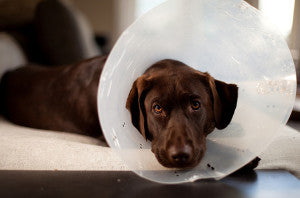Research in the field of dog health has brought to light an unfortunate finding relating to cancer in canines. It shows that one in four dogs is bound to develop this disease eventually irrespective of its breed type. Perhaps manipulating all of its causes is not in the hands of the dog owner but some preventive measures can effectively keep cancer away.
Do Not Opt for Early Neutering/Spaying: A study conducted almost 15 years ago showed that there was a direct link between early neutering and increased risk of osteosarcoma in male/female Rottweilers that were castrated before they turned a year old. Another research proved that the chances of bone cancer doubled in large pedigree dogs that were neutered vis-à-vis the ones that weren’t neutered. Even if you opt to sterilize your pet wait until it’s mature in terms of overall growth including that of bones, do not mix this with sexual maturity. Smaller breeds gain maturity at 9 to 12 months whereas larger breeds gain full growth at around two years of age.
Toxins in Detergents, Soaps, Pesticides et al. can cause cancer so beware: Try and replace insect sprays, pesticides and soaps with organic options that are safe and non-toxic. Room fresheners too contain harmful ingredients. Cigarette smoke is a well known environmental carcinogen. We must avoid exposing our pooches to cancer causing substances mentioned in this piece.
Physical Activity is a Must for keeping your Dog Healthy: Daily exercise for your canine companion is not only crucial in maintaining an ideal weight but also preventing Diabetes, heart disease and cancers. Lack of activity is the root cause of many canine illnesses and can further worsen the medical condition once it appears.(image-myactivedog.com)
Flea and Tick removal products should be used sparingly: Dr. Dobozy member of the pesticide division of the Environmental Protection Agency in the United States has brought to the forefront that Fipronil found in flea/tick products causes thyroid cancer and also alters the thyroid hormones. Some flea and tick control products contain carcinogenic ingredients such as Permethrin and Pyriproxyfen. Permethrin when tested on Lab animals was found to cause lung cancer and tumors in the liver. It’s best to go the natural route when treating fleas and ticks in dogs. You can opt for herbal tick/flea powder and herbal collars. A solution of 2 tablespoons of almond oil + rose geranium oil can be prepared and applied around the dog’s neck area before stepping out with it. Another organic repellent can be prepared using lemon. Cut one lemon into four sections and put it in a jar, then add boiling water to it and let it stay overnight undisturbed. Next morning add this solution into a spray bottle and spurt over the head, at the back of the ears, at the edge of the tail and in the armpits of the dog.
An organic Dog Diet: Food that is superior in quality, free of preservatives and artificial coloring is a must for maintaining overall health of the canine as well as preventing cancer.
Decrease Vaccination Use: The Journal of Veterinary Medicine in August 2003 stated clearly the link between vaccination and cancer, elaborating that vaccines lead to cancer at their injection sites in dogs. Also surrounding areas in the dog’s body can develop cancer that is not directly connected to the vaccination site. A common vaccine named adjuvant: aluminum is considered the main culprit here. World Health Organization in the year 1999 labeled aluminum hydroxide a grade 3 carcinogen, with grade 4 being the most carcinogenic. This cancer causing substance is injected in the pet through vaccination. It’s best to consult the veterinarian regarding titer test that helps to find out if your dog has responded sufficiently to a vaccine or not. The need to revaccinate the dog is eliminated in case it has responded to the vaccine.
All of these toxic substances enter the dog’s body only to attack the DNA thereby causing Cancer. However your dog is naturally fitted with a gene called p53 that kills cancerous cells. The ability of the p53 gene to fight cancer cells gets hampered with a continuous exposure to carcinogens/toxins. Toxins damage this gene and consequentially lead to the spread of cancer-cells.
It’s best to act like a vigilant dog parent and adopt safe alternatives & a healthy lifestyle for your pooch as prevention of cancer is better than having to cure it.

